Related Research Articles
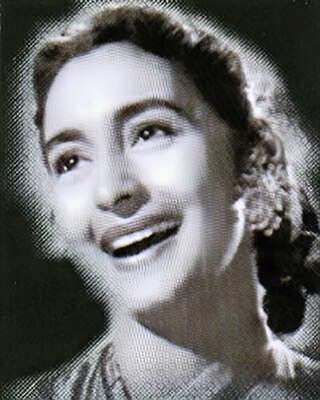
Nutan Samarth-Bahl, known mononymously as Nutan was an Indian actress who worked primarily in Hindi films. In a career spanning four decades, she appeared in more than 80 films, that ranged in genre from urban romances to socio-realist dramas. Regarded as one of the finest actresses in the history of Indian cinema, Nutan was noted for her naturalistic acting in parts of conflicted women often deemed unconventional. She was the recipient of six Filmfare Awards, including a record five Filmfare Award for Best Actress. In 1974, Nutan received the Padma Shri, India's fourth highest civilian award.

Tanuja Mukherjee, known mononymously as Tanuja is an Indian actress who predominantly works in the Hindi film industry. Part of the Mukherjee-Samarth family, she is the daughter of actress Shobhna Samarth and producer Kumarsen Samarth, younger sister of actress Nutan and was married to filmmaker Shomu Mukherjee, with whom she has two daughters, actresses Kajol and Tanisha. A recipient of two Filmfare Awards, Tanuja is best known for her roles in the Hindi films like Memdidi (1961), Chand Aur Suraj (1965), Baharen Phir Bhi Aayengi (1966), Jewel Thief (1967), Nai Roshni (1967), Jeene Ki Raah (1969), Haathi Mere Saathi (1971), Anubhav (1971), Mere Jeevan Saathi (1972), Do Chor (1972) as well as in Bengali films like Deya Neya (1963), Antony Firingee (1967), Teen Bhubaner Pare (1969), Pratham Kadam Phool (1970), Rajkumari (1970). Her pairings with actors Uttam Kumar, Rajesh Khanna, Dharmendra, Sanjeev Kumar were popular in the late 1960s and early 1970s.

Rattan Bai was an Indian actress and singer. She was the mother of actress Shobhna Samarth, grandmother of actresses Nutan and Tanuja, great-grandmother of actresses Kajol, Tanishaa Mukerji and actor Mohnish Bahl.
The Mukherjee-Samarth family is a Hindu Bengali-Marathi family that has been involved in the Hindi film industry since the 1930s, Shobhana Samarth having first acted in a film in 1935. The Mukherjee family was connected to the Samarth family by Tanuja's marriage to Shomu Mukherjee in 1973.

Motilal Rajvansh was an Indian actor and the winner of Filmfare Best Supporting Actor Award for Devdas (1955) and Parakh (1960). He is credited with being among Hindi cinema's first natural actors.

Sashadhar Mukherjee was an Indian filmmaker in Hindi cinema. He started his career with Bombay Talkies in the 1930s, and later established Filmistan Studio with Rai Bahadur Chunilal, Ashok Kumar and Gyan Mukherjee in 1943. In the 1950s, he went on to start his independent studio, Filmalaya. He is noted for films like Dil Deke Dekho (1959), Love in Simla (1960), Ek Musafir Ek Hasina (1962) and Leader (1964). He is part of the distinguished Mukherjee clan of Bollywood.
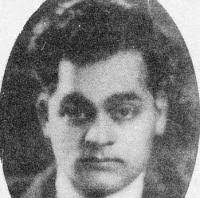
Kumarsen Samarth was an Indian film director. His inclination towards the Marathi language led him to direct some great Marathi/Hindi movies such as Nal Damyanti and Rupaye ki Kahani (1948). His biggest success was the 1955 Marathi film titled Shirdi che Saibaba on the life of the 19th century holyman by the same name. He studied cinematography in Germany and came back to India. He married his distant cousin, Shobhna Samarth, an aspiring actress. They married on the condition that she would be allowed to continue her acting career. They had four children, including the famous film actresses Nutan and Tanuja. He and his wife even made some films together. After fourteen years of marriage, Kumarsen and Shobhana separated amicably but never divorced. After their separation, Shobhana lived with film actor Motilal. Kumarsen died in his mid-70s. He belonged to a Marathi CKP family.

Nalini Jaywant was an Indian actress who appeared in Hindi films in the 1940s and 1950s. Filmfare in their poll in the 1950s declared her the most beautiful woman in the movies. Actor Dilip Kumar described her "the greatest actress he ever worked with".
Bambai Ki Sair also known as Holiday in Bombay is a Bollywood social comedy film. It was released in 1941 and directed by Sarvottam Badami for Sudama Productions. The music direction was by Khemchand Prakash with lyrics by D. N. Madhok, Munshi Dil, B.R. Sharma and Pandit Indra. The film starred Shobhna Samarth, Sabita Devi, E. Billimoria, Jal Merchant, Arun, Vatsala Kumtekar Kantilal and Ghory.

Ram Rajya is a 1943 Hindi film, directed by Vijay Bhatt, with Prem Adib and Shobhna Samarth in the lead roles of Rama And Sita. It was the third highest grossing Indian film of 1943.
Kokila (transl. Nightingale) is a 1937 Hindi social family drama film directed by Sarvottam Badami. The music was composed by Anil Biswas with lyrics written by Siddiqui and Zia Sarhadi. The story was adapted from the well-known novel Kokila, written by Gujarati writer Ramanlal Vasantlal Desai. The film starred Motilal, Sabita Devi, Shobhna Samarth, Maya Bannerjee, Sitara Devi, Pesi Patel, Siddiqui and Kayam Ali.
Rambaan is a 1948 Indian Hindi-language mythological drama film directed and produced by Vijay Bhatt and written by Mohanlal Dave, with dialogue by Pandit Girish. The film starred Prem Adib as Rama and Shobhana Samarth as Sita, with Chandra Mohan, Umakant, Amirbai Karnataki and Raj Adib in other principal characters. The film's music was composed by Shankar Rao Vyas.

Ramayan is a 1954 Hindi religious film based on Valmiki's Ramayana, produced and directed by Vijay Bhatt for Prakash Pictures. The music directors were Shankar Rao Vyas and Hariprasanna Das and the lyrics were written by Ramesh Gupta, Pandit Indra, Neelkanth Tiwari, Baalam Pardesi. The film starred Prem Adib and Shobhana Samarth once again as Rama and Sita. The two actors had earlier acted in a trilogy of Bhatt's films based on the Ramayana, Bharat Milap (1942), Ram Rajya (1943) and Rambaan (1946). All three had been extremely successful, with the audience accepting them in the traditional roles. The other costars included Shahu Modak, Durga Khote, and Umakant.

Veer Kunal also called Son Of Ashoka is a 1945 Hindi historical fiction film directed by Kishore Sahu. Besides directing the film Sahu also produced it and wrote the story and screenplay. The cinematographer was Chandu. Produced under the Ramnik Productions banner, it had music by Khan Mastana. The starcast consisted of Kishore Sahu, Shobhna Samarth, Durga Khote, Mubarak and Maya Banerji.

Prem Adib was an Indian actor. He was acclaimed as one of the top Bollywood actors of the 1940s, along with the likes of Pahari Sanyal, Ashok Kumar, P. C. Barua and Master Vinayak. Adib is best remembered for his roles as Lord Rama in Bharat Milap (1942) and Ram Rajya (1943). These films had him paired with Shobhana Samarth as Sita, and the duo came to be celebrated as an embodiment of chaste love and "traditional Indian values". Adib and Samarth continued as the holy Rama-Sita pair in another Ramayana-based film, Rambaan (1948). From 1943 to 1950, the Adib-Samarth screen pair became popular enough to be featured on covers of religious publications and on thousands of calendars, which would be placed in Hindu temples as objects of worship.
Chhabili is 1960 Hindi drama film directed by Shobhna Samarth under the banner of Shobhana Pictures. The film was made by Samarth to launch her daughter Tanuja.
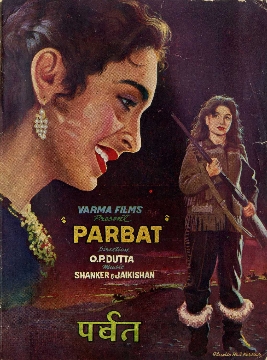
Parbat is a 1952 Bollywood film starring Prem Nath, Nutan, and K. N. Singh. The film was produced and distributed by Varma Films and directed by O.P. Dutta.
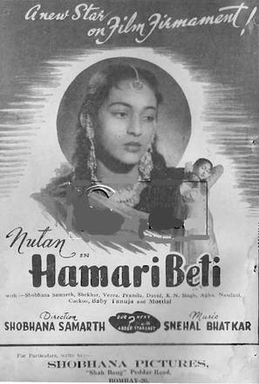
Hamari Beti is a 1950 Indian Hindi social comedy film. The directorial debut of Shobhna Samarth, it was the first film produced under her production company, Shobhana Pictures, to launch the acting career of her 14-year-old daughter Nutan, who played the title role. Samarth and Motilal, who wrote the script, starred as Nutan's parents, and Samarth's younger daughter Tanuja also made her debut in this film as a child artiste. Nutan contributed to Snehal Bhatkar's soundtrack for the film, singing the song "Tujhe Kaisa Dulha Bhaaye Re". The film released to considerable attention for Nutan's work.
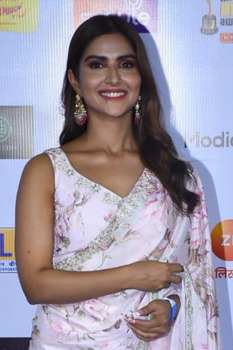
Pranutan Bahl is an Indian actress and a professional lawyer, who primarily works in Hindi films. The daughter of actors Mohnish Bahl and Ekta Sohini, Bahl made her acting debut with Notebook (2019) for which she received a nomination for the Filmfare Award for Best Female Debut. She has since starred in Helmet (2021) and Amar Prem Ki Prem Kahani (2024).
References
- ↑ "Filmfare Awards Winners From 1953 to 2024". Filmfare.com. Special Veterans Award - Shobhana Samarth. Retrieved 23 March 2024.
- ↑ "Shobhna Samarth produced daughter Tanuja's debut film - Times of India". The Times of India. Retrieved 6 November 2020.
- ↑ Joshi, Lalit Mohan (21 February 2000). "Obituary: Shobhana Samarth". The Guardian . Retrieved 5 June 2017.
- 1 2 Patel, Baburao (March 1942). "Interview-Banker's Daughter Becomes Glamour Girl!". Filmindia. 3 (3): 55. Retrieved 28 August 2015.
- 1 2 Khubchandani, Lata. "At This Age, I'm Priceless". Rediff.com. Retrieved 28 August 2015.
- ↑ "Vilasi Ishwar". citwf.com. Alan Goble. Archived from the original on 23 September 2015. Retrieved 28 August 2015.
- ↑ Heidi R.M. Pauwels (17 December 2007). Indian Literature and Popular Cinema: Recasting Classics. Routledge. pp. 52–. ISBN 978-1-134-06255-3 . Retrieved 28 August 2015.
- ↑ D, Johnny. "Star couples search for love". Hindustan Times. Retrieved 25 December 2016.
- ↑ Rediff On The Net
- ↑ "Kajol's Feminist Role Models: Grandmother Shobhna Samarth, Great-Grandmother Rattan Bai". NDTV.com. Retrieved 6 November 2020.
- ↑ "Shobhana Samarth dead". The Indian Express. 10 February 2000. Retrieved 5 June 2017.
- ↑ "1st Filmfare Awards, 1953" (PDF). Archived from the original (PDF) on 12 June 2009. Retrieved 2 August 2007.